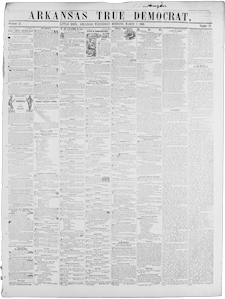April 8, 1863, Arkansas True Democrat (Little Rock)
Some six or eight weeks ago, handbills and circulars were sent all over the State, notifying country dealers and merchants that the subscriber thereto was prepared to furnish some 50,000 pairs of cotton cards, calicoes, and other things, on terms that would enable them to supply families at low rates. A lively correspondence was soon opened with parties from every section of the State, and a large number of dealers, speculators, and some few who were desirous of benefiting their neighborhoods, visited the city to purchase cards and other things. They were referred to George W. Curtis, a shrewd fellow, who was book-keeper in a well known commercial house in the West for many years, and known to a great many persons in the city. The dealers were taken to a building on the river bank, and let to a cellar where boxes marked in the usual manner, with the numbers of pairs and the number of the size of the cotton cards were snugly stowed. Curtis, it appears, made no secret that these cards were smuggled, and liable to confiscation, but that was the reason why he was enabled to sell them so cheaply, some heavy sales being effected at twelve hundred and fifty dollars for each one hundred pairs. An open box or two of the cards were shown as samples. Secrecy was enjoined, as it was desirable not to let the law officers get on the scent, and as the building was near the river, it was very easy for purchasers to quietly move their boxes on a boat and carry them off.–As the demand was so great, purchasers were advised to pay for their cargo and secure their boxes, which were to be delivered early in April. Others engaged to take large quantities, one contract being to the tune of $30,000. About the first of April, Curtis told a number of his patrons that he expected every hour a large lot of dry goods and needed money, and the parties might take the cards, or take part in cotton cards and part in dry-goods when the latter came. Curtis, it appears, had a partner, whose name we did not learn and two or three others were in some way connected with the concern. The whole party boarded at the Hayne’s Hotel, and it appeared that the money received for the cards, or a good part of it was deposited with Haynes for safe keeping. A few nights since the partner of Curtis, accompanied by another of the parties, presented an order to Mr. Haynes, from Curtis, for the money. The paper money was in a box and some $1,000 in specie, in a bag. Haynes took the money from the safe and delivered it to them, but the lateness of the hour excited his suspicions and he told them they had better leave the money and call for it in the morning. They drew their pistols and prevented him from locking up the money again, took it up stairs to a room; but returned in a few minutes, handed him the box, said they were joking and went off. As they had not returned the specie, Haynes followed them, overtook the one who had the gold, took his arm and walked with him down the street expostulating, until they came in sight of two or three soldiers on guard, when the fellow got scared, dropped the bag of gold and ran off. Upon his return to the hotel, Mr. Haynes examined the box, and found the money had been abstracted and old newspapers put in its place. The next morning, the buyers of cotton cards became uneasy and proceeded to examine their purchases, when, to their dismay, they found that each box had in it nothing but a few sticks of wood so arranged that they sounded like the handles of the cards rattling, and weighing about the same as a box of cards would weigh.–Curtis & Co., have vamosed the ranche, and the buyers of the cotton cards may be seen looking very blue, each with a small stick of wood under his arm.
Our lawyers are all busy discussing the question as to whom the $1,000 in gold belongs. One says to Haynes, for the fellow dropped it at his feet, and Haynes is bound to retain it until called for. Others say that it must be returned to those who paid the specie for cotton cards which they never received. Still others, contend that it should be divided, prorata, among all the victims, those who paid paper as well as those who paid gold. No decision has been arrived at, up to the time of our going to press, but the occurrence has given rise to any amount of witticisms and puns. It was a well planned scheme, boldly carried out, and the victims have learned the force of the old adage “never buy a pig in a poke,” which they alter to “never buy cotton cards in boxes.”
